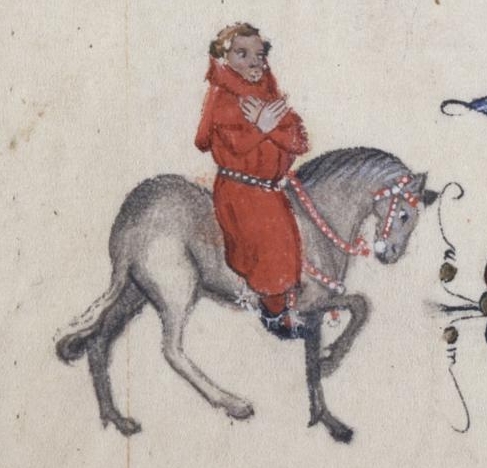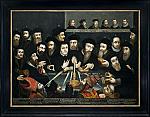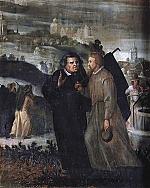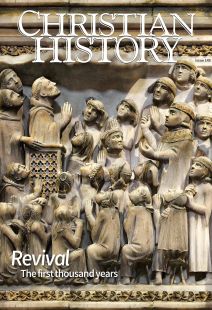Preaching for revival

[The Parson in the Ellesmere manuscript of Geoffrey Chaucer's Canterbury Tales.—public domain, Wikimedia File:The Parson - Ellesmere Chaucer.jpg]
Our sweet lord God of heaven, who wills to destroy no man, but wills that we come all to the knowledge of him, and to the blissful life that is imperishable, admonishes us by the prophet Jeremiah, who says in this way: “Stand upon the ways, and see and ask of old paths (that is to say, of old sentences) which is the good way. And walk there in that way, and you shall find refreshing for your souls” [Jer. 6:16]. Many are the spiritual ways that lead folk to our Lord Jesus Christ and to the reign of glory. Of which way, there is a full noble way and full convenient and proper, which may not fail to man nor to woman who through sin has mis-gone from the right way of Jerusalem celestial. And this way is called penitence, of which man should gladly hearken and enquire with his heart.—“The Parson’s Tale,” by Geoffrey Chaucer, c. 1387–1400, modernized by Jennifer Woodruff Tait; the parson may have been based on a Lollard preacher.
For now in the last days, when priests have been turned to avarice, stones shall cry. . . . Here may men touch of all manner of sin, and especially of false priests, traitors to God, who should truly call men to bliss and tell them the way of the law of Christ, and make known to the people the cautions of Antichrist.—John Wycliffe, sermon for the second Sunday after Trinity, late 1300s, modernized by Jennifer Woodruff Tait
Dear saint, pray for the people of Pilsen, that in this matter they may be imitators of you; and then, as of old, they will spread abroad God’s word, will love sermons preached against sins, will embrace their true leaders and reject ravening wolves. Then they will perceive that he who chastises leads them to God, while the flatterer separates them from God, and that while the flatterer nourishes with poison, the chastiser restores with wine. They will remember that they are soon to die, and that he who dies well will be in bliss, while the wretch that has defiled himself will fall into eternal fire.—Jan Hus, letter to the people of Pilsen, 1412, translated by David Schaff
In these days, prelates and preachers are chained to the earth by the love of earthly things. The care of souls is no longer their concern. They are content with the receipt of revenue. The preachers preach to please princes and to be praised by them. They have done worse. They have not only destroyed the Church of God. They have built up a new Church after their own pattern. Go to Rome and see! In the mansions of the great prelates there is no concern save for poetry and the oratorical art. Go thither and see! Thou shalt find them all with the books of the humanities in their hands and telling one another that they can guide men’s souls by means of Virgil, Horace and Cicero. . . . The prelates of former days had fewer gold miters and chalices and what few they possessed were broken up and given to relieve the needs of the poor. But our prelates, for the sake of obtaining chalices, will rob the poor of their sole means of support. Dost thou not know what I would tell thee! What doest thou, O Lord! Arise, and come to deliver thy Church from the hands of devils, from the hands of tyrants, from the hands of iniquitous prelates. —Sermon of Savonarola, c. 1490s, quoted in volume V.2 of History of the Christian Church by Philip and David Schaff
By the editors and translators
[Christian History originally published this article in Christian History Issue #149 in 2023]
Next articles
Dormant and exploding volcanos
Revivals kept breaking out in the Reformation—but sometimes when people didn’t want them to
Edwin Woodruff TaitWhat does it mean to live in Christ?
Reforming and challenging words from Martin Luther
Martin Luther and translatorsQuestions for reflection: Renewal, revival, and reform
Use these questions on your own or in a group to reflect on medieval renewal movements.
the editorsRecommended resources: Medieval renewals
Read more about revival, renewal, and reform in the Middle Ages in these resources recommended by our authors and the CH team
the editors and authorsSupport us
Christian History Institute (CHI) is a non-profit Pennsylvania corporation founded in 1982. Your donations support the continuation of this ministry
Donate







